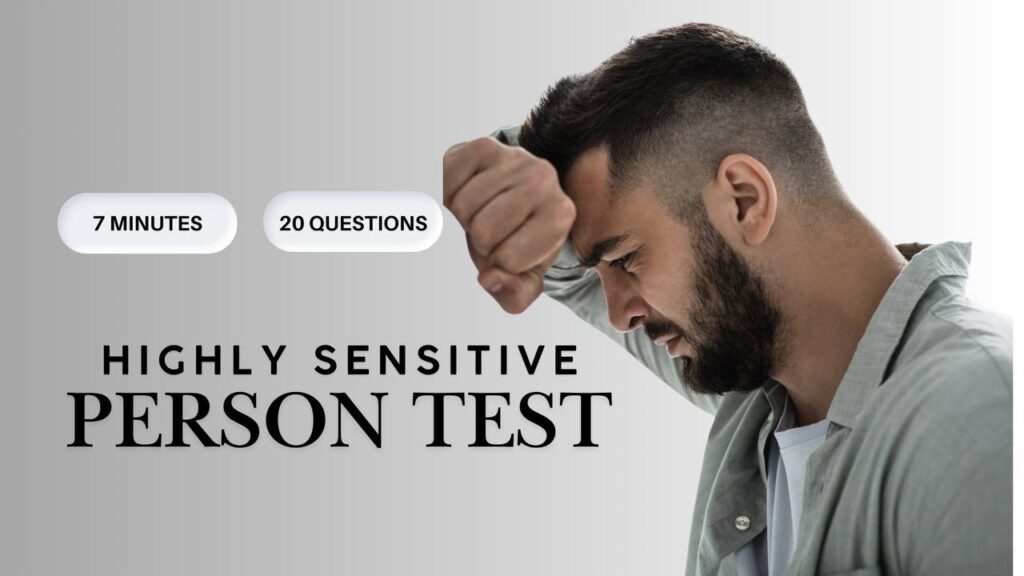
Results
Highly Sensitive Individual
- What This Means: Your responses strongly indicate high sensitivity, both emotionally and physically. You may be deeply affected by your surroundings and interpersonal interactions.
- Insights:
- Heightened emotional responses to situations or stimuli.
- Strong empathy and awareness of others’ emotions.
- Sensitivity to sensory inputs like noise, light, or crowded environments.
- Next Steps:
- Practice self-care techniques to manage overstimulation.
- Set boundaries to protect your emotional and physical well-being.
- Embrace your sensitivity as a strength, particularly in understanding and connecting with others.
Moderately Sensitive Individual
- What This Means: Your responses suggest a moderate level of sensitivity, with occasional heightened emotional or physical responses.
- Insights:
- Emotional awareness balanced with resilience.
- Sensitivity to environmental factors, though not overwhelming.
- Occasional need for quiet or alone time to recharge.
- Next Steps:
- Reflect on the situations that trigger strong sensitivity.
- Develop strategies to manage emotional and sensory inputs effectively.
- Leverage your sensitivity to build deeper relationships and enhance creativity.
Balanced Sensitivity
- What This Means: Your responses suggest a balanced approach to sensitivity, with a mix of emotional and physical awareness and resilience.
- Insights:
- Sensitivity that fluctuates depending on circumstances.
- Ability to empathize while maintaining emotional boundaries.
- Occasional reactions to intense stimuli but overall adaptability.
- Next Steps:
- Pay attention to patterns in your sensitivity responses.
- Use mindfulness techniques to stay grounded during emotionally intense moments.
- Cultivate environments that support both your resilience and sensitivity.
Low Sensitivity to Stimuli
- What This Means: Your responses indicate low sensitivity levels, suggesting strong emotional and physical resilience.
- Insights:
- Ability to navigate social and environmental stressors with ease.
- Minimal impact of sensory or emotional triggers on daily life.
- Focused and pragmatic approach to challenges.
- Next Steps:
- Continue building emotional awareness to strengthen interpersonal connections.
- Be mindful of how others’ sensitivity might differ from yours.
- Use your resilience to support sensitive individuals in your life.
Minimal Sensitivity
- What This Means: Your responses strongly indicate minimal sensitivity, with high resilience to emotional and physical stimuli.
- Insights:
- Exceptional ability to remain unaffected by external stressors.
- Logical and composed approach to emotional and sensory challenges.
- Strong focus and consistency in various environments.
- Next Steps:
- Consider exploring deeper emotional connections with others.
- Use your stability to create supportive spaces for those who may be more sensitive.
- Continue leveraging your strengths to navigate complex situations with ease.
#1. I’m easily overwhelmed by strong sensory input.
#2. Other people’s moods strongly affect me.
#3. I tend to be sensitive to pain.
#4. I’m easily overwhelmed by things like bright lights, strong smells, coarse fabrics, or sirens.
#5. I notice when small things have changed in my environment.
#6. I have a rich, complex inner life.
#7. I enjoy violent films, TV shows, and movies.
#8. I am deeply moved by the arts and music.
#9. Loud noises make me feel uncomfortable.
#10. My nervous system sometimes feels so frazzled that I have to be alone.
#11. I’m highly conscientious.
#12. I get scared easily.
#13. When people are uncomfortable in a physical environment I tend to know what would make it more comfortable (like changing the lighting or the seating).
#14. I thrive when I have a lot to do in a short amount of time.
#15. I notice and enjoy delicate scents, tastes, sounds, and works of art.
#16. I make it a high priority to arrange my life to avoid upsetting or overwhelming situations.
#17. On busy days, I need to leave, lie down, and look for a dark room or another place where I can find relief from stimulation.
#18. Intense stimuli, like loud noises or chaotic scenes, don’t bother me.
#19. I get annoyed when people try to get me to do too many things at once.
#20. When I was a child, my parents or teachers saw me as sensitive or shy.
Previous
Finish


